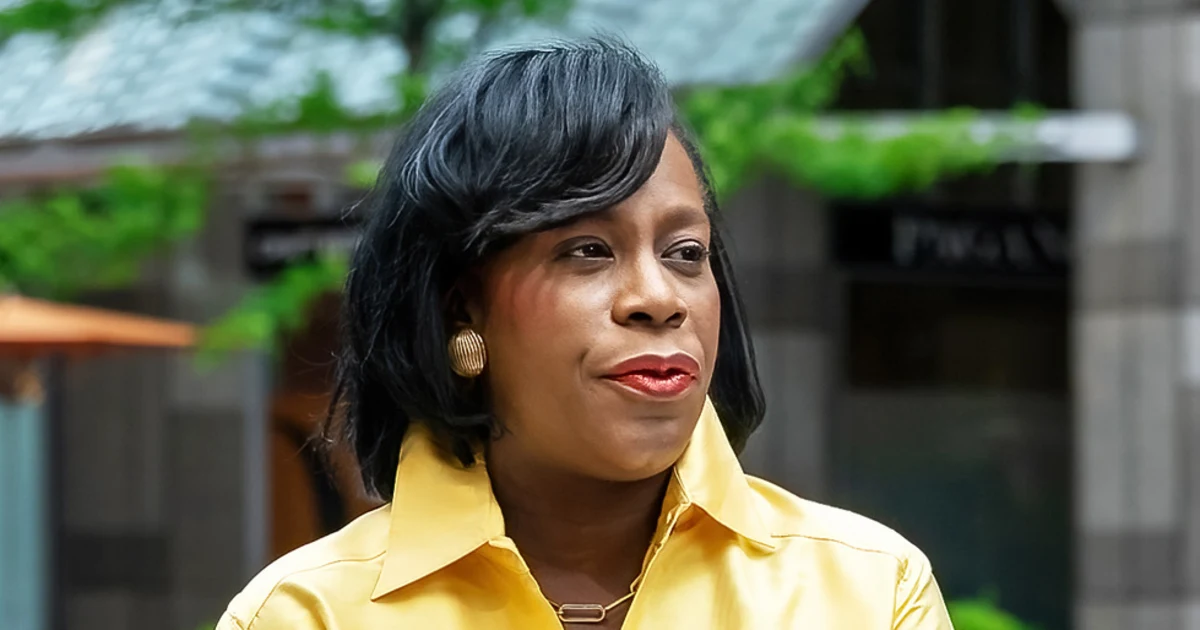In one of her campaign ads, Cherelle Parker, then the Democratic nominee for mayor in Philadelphia, speaks candidly about the power of representation.
“We’ve had 99 mayors and not one of them looks like you or me,” she told voters. “Let’s just say that I’ll bring a different touch.”
Indeed, Parker was handily elected Philadelphia’s 100th mayor on Tuesday, with 73.8% of the vote against Republican David Oh. The win is historic, with Parker shattering barriers to become both the city’s first woman and first Black woman in its executive seat.
Born to a single teenage mother who died during Parker’s childhood, the 51–year-old mayor-elect was raised by her grandparents. She attended public schools and cut her teeth in politics as a high school intern for then-Philadelphia City Councilwoman Marian Tasco.
Parker became the first in her family to attend college, and after graduating from Lincoln University in Pennsylvania, she taught high school English as well as English as a Second Language to immigrant children and adults. Later, she earned a Master’s degree from the University of Pennsylvania.
Encouraged by Tasco to return to public service, she accepted a City Council position and rose through the ranks to become a senior staffer to her political mentor.
In 2005, Parker made history as the youngest Black woman elected to the Pennsylvania House of Representatives, representing northwest Philadelphia.
In the state House she chaired the city delegation, earning a reputation as an effective legislator who championed public policies aimed at enhancing the quality of life for working-class people, seniors, women, children and families.
After a decade serving as a state representative, Parker was elected to the Philadelphia City Council in November 2015. She served the 9th District until stepping down to run for mayor, and won a hotly contested primary with 32% of the vote.
Rep. Dwight Evans, a Democrat who represents Pennsylvania’s 3rd Congressional District, is among the elected officials, labor groups, clergy and community advocates who endorsed Parker early on.
Evans and Parker go way back, personally and professionally. He recalls pushing her to run for the state Legislature decades ago.
“Cherelle has a vision for this city that people believe in and they trust in her leadership skills to tackle the tough issues we face right now,” said Evans via a spokesperson. “Nothing was handed to her, and I truly believe that Cherelle will meet the moment when she is sworn in as our 100th mayor in January. I’m proud to call her a dear friend and soon, proud to call her my Mayor.”
Parker, who has an 11-year-old son, has emphasized how she stands on the shoulders of people in Philadelphia’s Black community and beyond who nurtured her ambitions. “I didn’t arrive here by myself. I didn’t pull myself up by my own bootstraps,” she said to NBC Philadelphia on election night. “There was a community and a village of people who lifted me up, that continue to lift my son up. They are how I make it everyday.”
Campaigning in neighborhoods across the City of Brotherly Love, her platform centered around increased public safety, education, economic opportunity and “cleaning and greening” the city.
Philadelphia is also grappling with a gun violence crisis. According to the office of the controller, as of Monday, Nov. 6, there have been 361 homicides (a 30% decrease from 2022), 1,162 nonfatal shooting victims and 330 fatal shooting victims. As council majority leader, Parker introduced a Neighborhood Safety and Community Policing Plan that includes hiring an additional 300 officers on foot and bike patrol.
“I’m uniquely prepared to make the city the safest, cleanest, greenest big city in the nation with access to economic opportunity for all,” she said previously. Reiterating that message on election night, she also called for “unity.”
Currently, eight Black women serve as mayors in the top 100 most populous cities in the U.S., according to the Center for American Women and Politics at Rutgers University.
Until now, Mayor Karen Bass of Los Angeles was the only Black woman to oversee one of the 10 most populated cities. Parker will be mayor of the sixth-largest city in the nation.
Despite such “firsts” for women, there is “still a ways to go,” toward reaching gender equality in political representation, said Debbie Walsh, director of CAWP. “What is important about this election is it breaks a barrier for the city, and for women. It shows other women, and women of color, that a high level of leadership is in fact attainable.”
Higher Heights for America PAC, which works to elect Black women nationwide, also endorsed Parker.
“She has spent her life serving the city, and now she will lead it,” said Aprill Turner, vice president of communications and external affairs. More broadly, Turner said, Parker is part of a rising tide of Black women taking leadership roles in major cities across the country.
“What we see in Philadelphia is what we have seen in Washington, D.C., San Francisco, Los Angeles, St. Louis, Charlotte, New Orleans, and other large cities,” she said. “Black women are stepping up to lead in these roles at a time when cities are facing their most demanding challenges.”
Parker, she said, will join a dynamic group of Black women who are “transcending” what these mayoral roles have typically looked like. “They bring their lived experiences to the office, which allows them to find creative and innovative solutions to the significant issues that these cities are facing.”
Flanked by family and supporters, an ebullient Parker told the crowd at her election night victory party that she is ready to lead. Her four-year-term begins in January.
“Who is Cherelle Parker going to be? A get-it-done Philadelphian,” she said. “A get-it-done mayor who won’t ever forget her deep roots. I’m Philly-born, I’m Philly bred, and I’ll be Philadelphian ’til I’m dead.”



